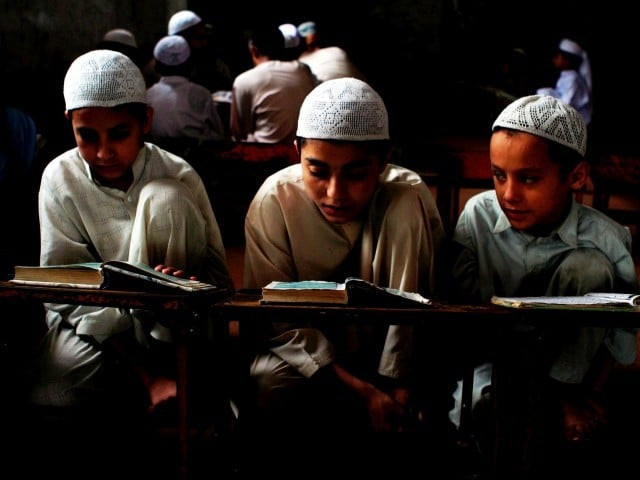Seminaries complain of being ignored
Officials say they lack support from FDE including textbooks, registration

Officials say they lack support from FDE including textbooks, registration.
PHOTO:FILE
There are around 40 madressa schools in the Islamabad Capital Territory where around 1,085 students are enrolled. However, they complain that the Federal Directorate of Education (FDE) — which oversees all educational matters in the city — has apparently adopted an indifferent attitude towards it.
Police investigating militant links after blast at Karachi seminary
Mohammad Shahid, who works at a seminary on the outskirts of the capital said that students at their facility lack proper books. To make matters worse, their students are not registered with the FDE, hence they cannot appear for board examinations, rendering them ineligible to compete with other students going to regular schools.
"I alone have to deal with a class of 35 students who are studying at the pre-primary and primary level. There is a dire need for another trained tutor to teach the students," he said pointing to his bare classroom.
He added that the FDE had a responsibility under Article 25-A of the Constitution to provide education for free up to the primary level and urged the FDE to pay due attention to madressas.
K-P govt hesitant to enforce madrassa registration
A visit to any of the various madressa-schools in the federal capital showed that while students were studying regular curriculum along with religious education from nursery to primary level. However, the seminaries lacked books and suffered from staff shortages.
Abdur Rehman, a madressa official said that as many as 55 students enrolled in his school of which around half, or 29, were studying from the primary to tertiary levels. He lamented the absence of basic facilities such as textbooks, notebooks and stationery for students.
Rehman said that while they had managed to acquire some books on their own, but they were not appropriate for teaching.
He added that most of the children in seminaries either belong to poor families or are orphans and hence lack resources that regular students do.
"The registration of madressas under the FDE was a key step in mainstreaming seminaries which have been neglected,” the madressa official said, adding that this has resulted in unintended consequences and complications such as students who are unable to appear in primary board examinations.
Madressa schools
The National Commission for Human Development (NCHD) had launched the 'madressa school’ project to bring seminaries into the mainstream and extend formal education to seminary students in federally controlled territories such as the Islamabad Capital Territory (ICT), the erstwhile federally administered tribal areas (Fata), Gilgit-Baltistan (G-B) and Azad Jammu and Kashmir (AJK).
NCHD’s Rana Ijaz said that convincing clerics and seminary teachers to teach a standard curriculum along with religious education at their seminaries appeared to be a daunting task.
However, Ijaz said that astonishingly the clerics were quite responsive and welcomed the madressa-school initiative hoping it would enable students to come into the forefront and compete with regular students.
While seminaries were operating efficiently at the provincial level without any impediment and having access to required resources and facilities, institutes at the federal level need to improve.
The NCHD official said that the project concept-I (PC-I) for establishing 500 madressa-schools, training courses for tutors and other paraphernalia had been sent to the concerned ministry for approval.
Once approved, he said that books and stationary will be provided all the madressa-schools who demand it.
By the end of September all the required books and essential items would be handed over by NCHD to the schools, he stated.
Ijaz, though, noted that since the project is part of the National Action Plan (NAP) it needs to be implemented in its true spirit to curb the menace of extremism in the country.
Replying to a question, he said that the Private Educational Institutions Regulatory Authority (PEIRA) has collaborated with NCHD to register madressa-schools and issue certificates to seminary students who clear board examinations for the fifth and eighth grades.
“It will help the huffaz to continue their studies to the matriculate level and beyond,” he remarked.
Published in The Express Tribune, September 1st, 2018.



















COMMENTS
Comments are moderated and generally will be posted if they are on-topic and not abusive.
For more information, please see our Comments FAQ